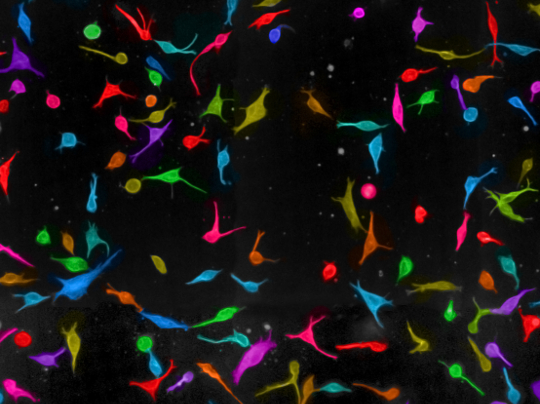Making key proteins at the driving edge of cancer cells is crucial for the spread of the disease around the body, new research concludes.
Scientists at The Institute of Cancer Research, London, found that cancer cells manufacture protein components that they need for growth locally, within outward, front-facing projections.
These local protein factories seem to be critical for the motility of cancer cells.
The study, published in the journal Developmental Cell, could open up new approaches to treatment, such as the development of drugs to block the ability of cancer cells to move and spread.
One way that cancer cells can become motile is to adopt an elongated shape that has distinct front and back facing sides.
The front end of these elongated or ‘mesenchymal’-shaped cells contains components of a molecular motor that drives the cell forward by forming finger-like projections.
The researchers, led by the late Professor Chris Marshall at the ICR, used a technique called mass spectrometry to analyse how different proteins are distributed throughout these polarised cancer cells, and found that proteins which drive cell movement were being manufactured inside the forward-facing projections.
When local production of motility proteins was blocked, cells were unable to form projections that allow mesenchymal shaped cancer cells to move – confirming the need for local manufacture for the spread of the disease.
Unexpectedly, a group of molecules called RNA-binding proteins were present at high levels at the forward-facing end of cells.
The researchers were able to show for the first time that these RNA-binding proteins have a role in cell movement by assisting protein production at the front of cancer cells and facilitating forward movement, leading to cancer spread.
They detected proteins that make up a cell component known as the RNA exosome complex in projections at twice the concentration found in the rest of the cell – and found these to be necessary for the cell’s shape change and movement.
The study was funded by Cancer Research UK.
Study first author Dr Faraz Mardakheh, a Postdoctoral Training Fellow at the ICR, said:
“Cancer’s ability to move is one of the first steps on the road to metastasis – the usually lethal spread of cancer cells round the body. Our study has found that cancer cells need to be able to make the key proteins for movement locally within forward-facing projections, and that this is likely to be regulated by RNA-binding proteins which concentrate at the front of the cell. It is an important discovery for our understanding of cancer movement and spread, and could open up new avenues of research into treatments to block metastasis, by trying to target RNA-binding proteins.
“Professor Chris Marshall was a great scientist and a fantastic mentor to me, and this is just another example of the work he led at the ICR throughout his long and successful career in cancer research.”
